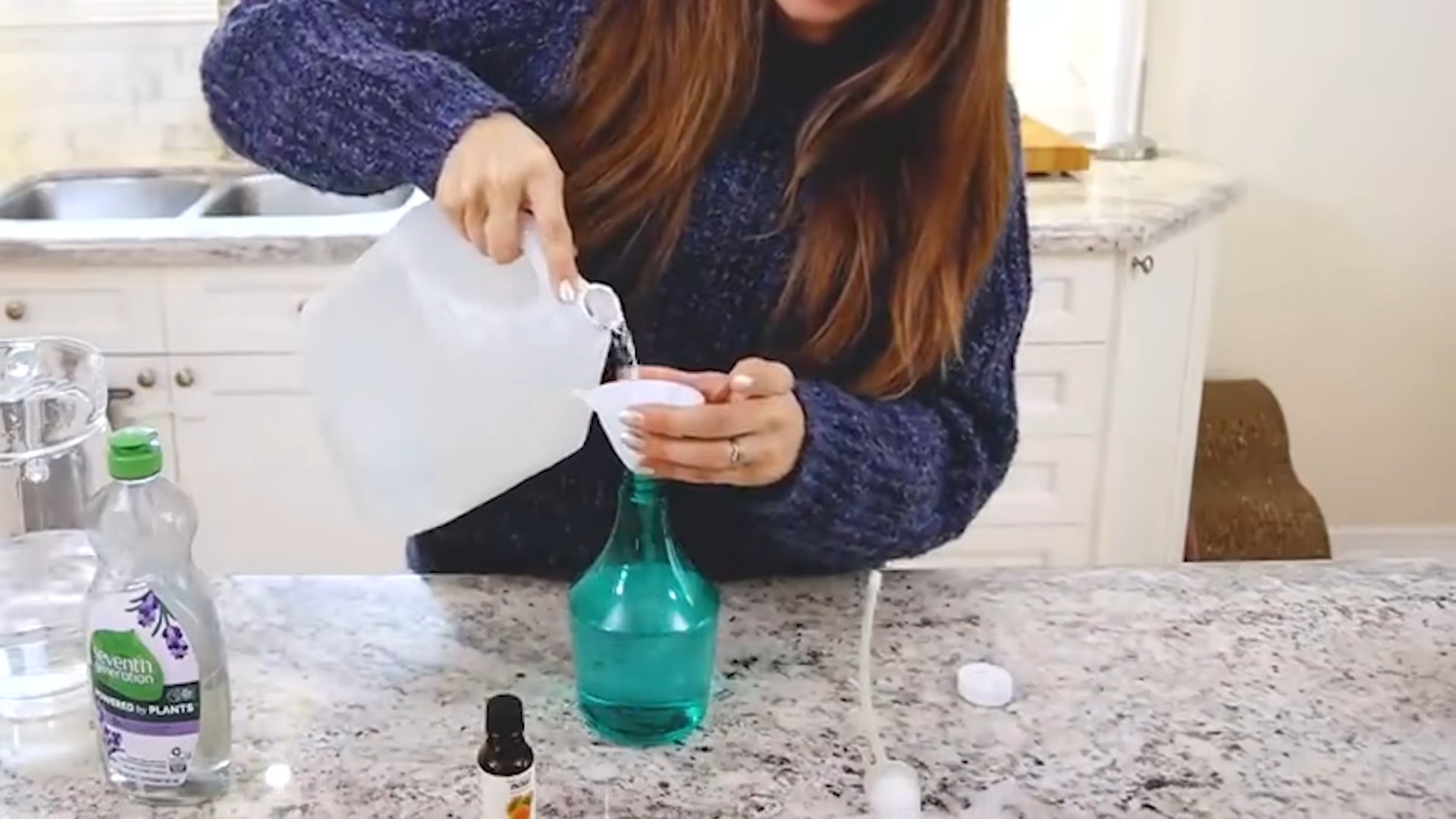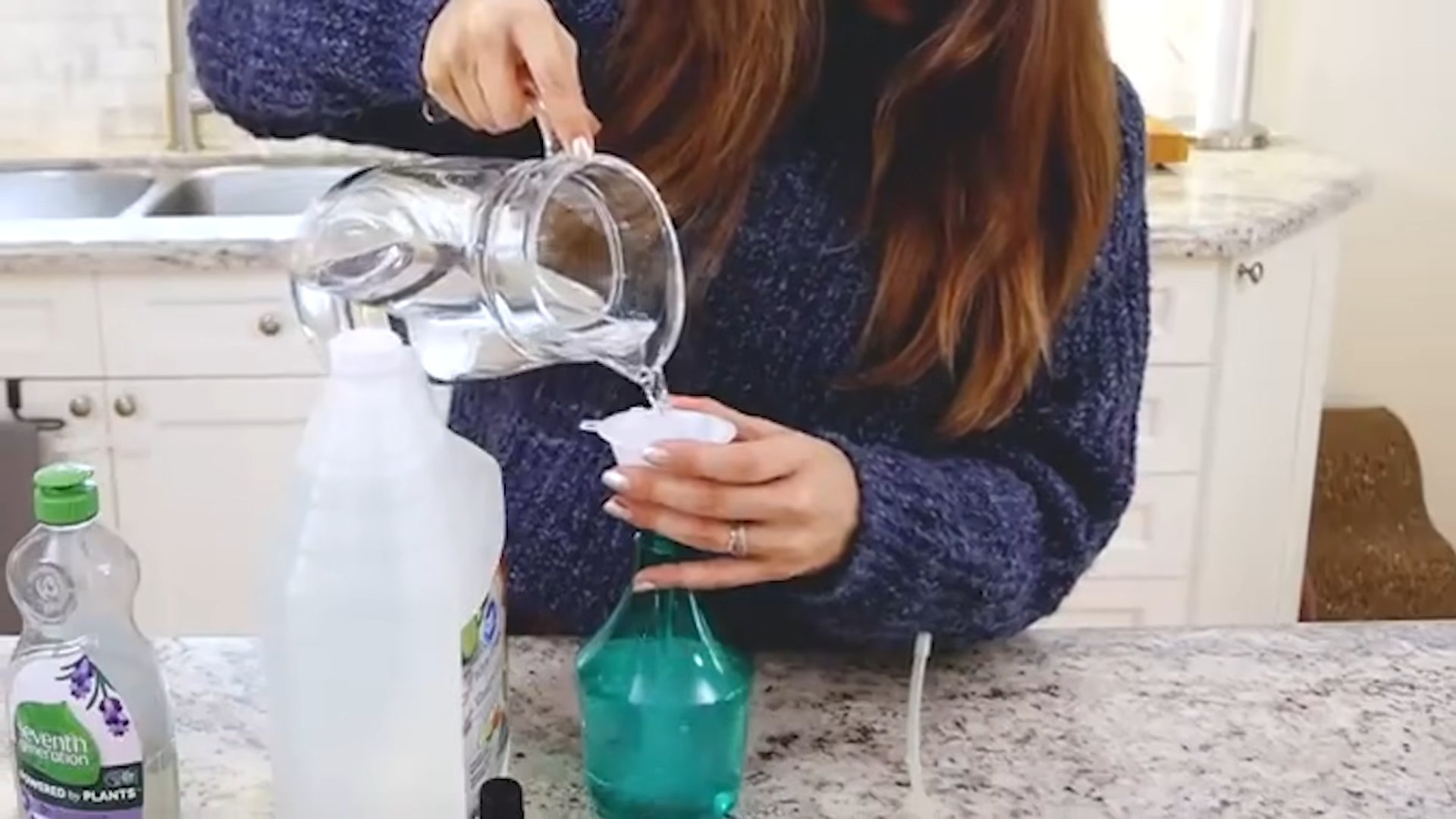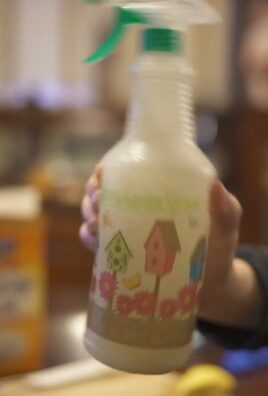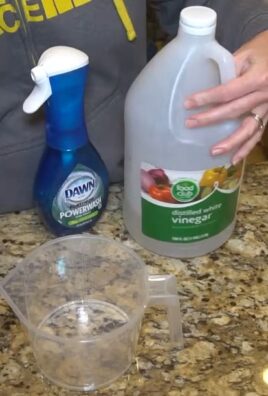Easy homemade glass cleaner – who knew achieving sparkling, streak-free windows could be so simple and satisfyingly budget-friendly? I’m always on the lookout for ways to ditch harsh chemicals and embrace a more natural approach to cleaning, and let me tell you, this DIY glass cleaner is a game-changer!
The quest for spotless windows isn’t new. In fact, throughout history, people have experimented with various concoctions to achieve that crystal-clear shine. From using vinegar-based solutions in ancient Rome to employing ammonia in more recent times, the desire for gleaming glass has been a constant. But why rely on expensive, store-bought cleaners packed with questionable ingredients when you can whip up your own effective solution in minutes?
Let’s face it, nobody enjoys looking through grimy windows. Whether it’s the build-up of dust, fingerprints, or stubborn water spots, dirty glass can dull your home’s appearance and even impact your mood. That’s where this easy homemade glass cleaner comes in. Not only will it save you money, but it’s also a fantastic way to reduce your environmental footprint. Plus, you’ll have the satisfaction of knowing exactly what’s going into your cleaning products. So, are you ready to unlock the secret to sparkling windows with just a few simple ingredients? Let’s get started!

DIY Streak-Free Glass Cleaner: Say Goodbye to Store-Bought!
Hey there, fellow DIY enthusiasts! Are you tired of spending money on expensive glass cleaners that promise streak-free shine but often fall short? I know I was! That’s why I decided to ditch the store-bought stuff and create my own super-effective, eco-friendly glass cleaner. And guess what? It’s incredibly easy and uses ingredients you probably already have in your pantry!
This recipe is my go-to for sparkling windows, mirrors, shower doors, and even my car windows. It’s safe, non-toxic, and leaves everything looking crystal clear. Plus, you’ll feel great knowing you’re reducing your environmental impact and saving money at the same time.
So, let’s get started! Here’s what you’ll need:
What You’ll Need:
* **White Vinegar:** This is the star of the show! Vinegar’s acidity cuts through grime and grease like a champ.
* **Distilled Water:** Using distilled water is key to avoiding mineral deposits that can cause streaks. Tap water can work in a pinch, but distilled is definitely the way to go for the best results.
* **Rubbing Alcohol (Isopropyl Alcohol):** This helps the cleaner evaporate quickly, preventing streaks and adding extra cleaning power.
* **Essential Oil (Optional):** While not essential for cleaning, a few drops of your favorite essential oil can add a pleasant scent and mask the vinegar smell. I personally love using lemon, lavender, or tea tree oil.
* **Spray Bottle:** A clean, empty spray bottle is a must for dispensing your homemade cleaner.
* **Microfiber Cloths:** These are the best for streak-free cleaning. Avoid using paper towels, as they can leave lint behind.
The Magic Ratio:
Okay, now for the secret formula! This ratio has worked wonders for me, but feel free to adjust it slightly to suit your preferences.
* 1 cup distilled water
* 1 cup white vinegar
* 1/4 cup rubbing alcohol (70% or higher)
* 5-10 drops of essential oil (optional)
Step-by-Step Instructions:
Ready to mix up your own batch of streak-free glass cleaner? Follow these simple steps:
1. **Gather Your Supplies:** Make sure you have all your ingredients and equipment ready to go. It’s always easier to have everything within reach before you start.
2. **Prepare the Spray Bottle:** Ensure your spray bottle is clean and dry. Any residue inside could contaminate your cleaner.
3. **Combine the Ingredients:** Carefully pour the distilled water, white vinegar, and rubbing alcohol into the spray bottle.
4. **Add Essential Oil (Optional):** If you’re using essential oil, add a few drops to the mixture. Remember, a little goes a long way!
5. **Shake Well:** Secure the spray bottle lid tightly and shake the mixture vigorously to ensure all the ingredients are thoroughly combined.
6. **Test in an Inconspicuous Area:** Before you go wild cleaning everything in sight, test the cleaner on a small, hidden area of the surface you plan to clean. This will help you ensure that the cleaner doesn’t damage or discolor the surface.
7. **Spray and Wipe:** Spray the glass cleaner onto the surface you want to clean. Don’t over-saturate it; a light mist is all you need.
8. **Wipe with a Microfiber Cloth:** Immediately wipe the surface with a clean, dry microfiber cloth. Use a circular motion to loosen any dirt and grime, then switch to a straight, overlapping motion to remove the cleaner and leave a streak-free finish.
9. **Repeat if Necessary:** For heavily soiled surfaces, you may need to repeat the spraying and wiping process.
10. **Admire Your Sparkling Clean Glass!** Step back and admire your handiwork! You’ve just created a powerful, eco-friendly glass cleaner that will leave your windows and mirrors looking amazing.
Tips and Tricks for the Best Results:
* Use a Clean Microfiber Cloth: This is crucial for achieving a streak-free finish. Dirty cloths will just spread the grime around. I like to keep a stash of clean microfiber cloths specifically for cleaning glass.
* Don’t Over-Saturate: Too much cleaner can actually make it harder to achieve a streak-free finish. A light mist is all you need.
* Work in Sections: For large windows or mirrors, work in smaller sections to prevent the cleaner from drying before you can wipe it off.
* Clean on a Cloudy Day: Direct sunlight can cause the cleaner to dry too quickly, leading to streaks. Cloudy days are ideal for cleaning windows.
* Vinegar Smell: If you’re sensitive to the smell of vinegar, don’t worry! The scent will dissipate quickly. Adding essential oils can also help mask the odor.
* Hard Water Stains: For stubborn hard water stains, you may need to pre-treat the area with a solution of equal parts vinegar and water. Let it sit for a few minutes before wiping clean.
* Safety First: While this cleaner is non-toxic, it’s always a good idea to wear gloves when cleaning, especially if you have sensitive skin.
Troubleshooting:
* Streaks: If you’re still getting streaks, try using a different microfiber cloth, diluting the cleaner slightly with more distilled water, or ensuring you’re not using too much cleaner.
* Residue: If you notice a residue, it could be due to hard water or using too much cleaner. Try using distilled water and reducing the amount of cleaner you use.
* Cloudiness: Cloudiness can be caused by using tap water or not shaking the cleaner well enough. Make sure you’re using distilled water and shaking the bottle thoroughly before each use.
Beyond Windows: Other Uses for Your Homemade Glass Cleaner
This versatile cleaner isn’t just for windows! Here are some other ways you can use it around your home:
* Mirrors: Keep your mirrors sparkling clean with a quick spray and wipe.
* Shower Doors: Prevent soap scum buildup by spraying your shower doors after each use.
* Car Windows: Get a clear view of the road with streak-free car windows.
* Chrome Fixtures: Polish your chrome fixtures to a brilliant shine.
* Stainless Steel Appliances: Remove fingerprints and smudges from your stainless steel appliances.
* Electronics Screens: *Important Note: Always spray the cleaner onto a cloth, not directly onto the screen. Use a very light mist and avoid getting any liquid inside the device.*
Why This Recipe Works: The Science Behind the Shine
You might be wondering why this simple combination of ingredients is so effective. Here’s a little science to explain it:
* Vinegar: The acetic acid in vinegar is a natural solvent that breaks down dirt, grease, and grime. It also helps to dissolve mineral deposits.
* Rubbing Alcohol: Alcohol is a degreaser and disinfectant. It also helps the cleaner evaporate quickly, preventing streaks.
* Distilled Water: Using distilled water prevents mineral deposits that can cause streaks.
By combining these ingredients, you create a powerful cleaning solution that is both effective and environmentally friendly.
Storing Your Homemade Glass Cleaner:
Your homemade glass cleaner can be stored in the spray bottle for several months. Just be sure to label the bottle clearly so you don’t accidentally use it for something else! I usually write “Glass Cleaner” on the bottle with a permanent marker. Store it in a cool, dark place away from direct sunlight.
Cost Comparison: Homemade vs. Store-Bought
Let’s break down the cost of making your own glass cleaner compared to buying it at the store.
* **Homemade:** The cost of the ingredients for this recipe is minimal, especially if you already have vinegar, rubbing alcohol, and essential oils on hand. A large bottle of vinegar costs only a few dollars, and you’ll only use a small amount for each batch of cleaner.
* **Store-Bought:** A bottle of commercial glass cleaner can cost anywhere from $3 to $10 or more, depending on the brand and size.
Over time, making your own glass cleaner can save you a significant amount of money. Plus, you’ll be reducing your consumption of plastic bottles, which is a win for the environment!
My Personal Experience:
I’ve been using this homemade glass cleaner for years, and I’m constantly amazed at how well it works. I used to dread cleaning windows, but now it’s a breeze. I love knowing that I’m using a safe, non-toxic cleaner that is also good for the environment. And the best part is, my windows have never looked better!
I encourage you to give this recipe a try. I’m confident that you’ll be just as impressed as I am. Happy cleaning!

Conclusion
So, there you have it! Ditching those expensive, chemical-laden store-bought cleaners and embracing this easy homemade glass cleaner is more than just a cost-effective choice; it’s a step towards a healthier home and a happier planet. We’ve shown you how simple it is to whip up a batch of sparkling solution with ingredients you likely already have in your pantry.
But why is this DIY trick a must-try? Beyond the savings, you’re gaining complete control over what you’re spraying in your living space. No more harsh fumes, no more worrying about mysterious ingredients. Just clean, clear glass and peace of mind. Plus, the satisfaction of creating something effective and eco-friendly is a reward in itself.
Looking to personalize your glass cleaner? Consider these variations:
* **For extra grime-fighting power:** Add a teaspoon of borax to the mix. Borax is a natural mineral that helps to cut through grease and stubborn stains.
* **To boost the scent:** Infuse your vinegar with citrus peels for a few days before using it in the recipe. Lemon, orange, or grapefruit peels will add a refreshing aroma to your cleaner. Alternatively, add a few drops of your favorite essential oil (lemon, lavender, or tea tree are great choices) to the finished solution.
* **For streak-free shine on mirrors:** Use distilled water instead of tap water. The minerals in tap water can sometimes leave streaks on mirrors.
We’re confident that once you try this easy homemade glass cleaner, you’ll never go back to store-bought versions. It’s effective, affordable, and environmentally friendly – a winning combination!
Now, it’s your turn! Give this recipe a try and see the sparkling results for yourself. We’re eager to hear about your experience. Share your tips, variations, and before-and-after photos in the comments below. Let’s build a community of clean-glass enthusiasts! Let us know if you found this easy homemade glass cleaner as effective as we do.
Frequently Asked Questions (FAQ)
Is this homemade glass cleaner safe to use on all types of glass?
Generally, yes, this homemade glass cleaner is safe for most glass surfaces, including windows, mirrors, glass tables, and shower doors. However, it’s always a good idea to test it on a small, inconspicuous area first, especially if you’re dealing with antique or delicate glass. Avoid using it on tinted windows, as the vinegar could potentially damage the tinting film. Also, be cautious when cleaning glass surfaces near natural stone, as vinegar can etch some types of stone.
Can I use a different type of vinegar?
While white vinegar is the most commonly recommended type for cleaning due to its acidity and lack of color, you can experiment with other types of vinegar, such as apple cider vinegar. However, be aware that apple cider vinegar has a stronger odor and may leave a slight residue, so you might need to adjust the water ratio accordingly. Avoid using balsamic vinegar, as its dark color and sugar content will likely leave streaks.
How long will this homemade glass cleaner last?
This homemade glass cleaner has a relatively long shelf life. When stored in a cool, dark place in an airtight container, it should last for several months. However, it’s best to use it within 6 months to ensure optimal effectiveness. If you notice any changes in color, odor, or consistency, it’s best to discard it and make a fresh batch.
What type of spray bottle should I use?
Any clean, empty spray bottle will work for this recipe. However, it’s best to use a bottle that hasn’t been used for harsh chemicals, as residue could contaminate your cleaner. A plastic spray bottle is a good option, but you can also use a glass spray bottle for a more eco-friendly choice. Make sure the spray nozzle is adjustable so you can control the spray pattern.
Will this glass cleaner leave a vinegar smell?
Yes, there will be a slight vinegar smell initially, but it will dissipate quickly as the cleaner dries. If you’re sensitive to the smell of vinegar, you can add a few drops of your favorite essential oil to the mixture to mask the odor. Lemon, lavender, and tea tree oil are all great options. You can also infuse your vinegar with citrus peels for a more subtle and natural scent.
How do I prevent streaks when cleaning glass?
To prevent streaks, use a clean microfiber cloth or paper towel to wipe the glass. Avoid using old or dirty cloths, as they can leave lint and streaks. Also, make sure to wring out the cloth well before wiping the glass. You can also try using a squeegee for larger surfaces like windows and shower doors. Overlapping each stroke slightly will help to prevent streaks.
Can I use this cleaner on my car windows?
Yes, this homemade glass cleaner is safe to use on your car windows. However, avoid spraying it directly onto the car’s paint, as the vinegar could potentially damage the finish over time. Instead, spray the cleaner onto a microfiber cloth and then wipe the windows.
Is this cleaner safe for pets and children?
This homemade glass cleaner is generally considered safe for pets and children, as it’s made with natural ingredients. However, it’s still important to keep it out of reach of children and pets, as ingestion could cause irritation. If your pet or child accidentally ingests the cleaner, contact a medical professional or veterinarian immediately.
Can I use this cleaner on other surfaces besides glass?
While this cleaner is primarily designed for glass, it can also be used on other non-porous surfaces, such as stainless steel, chrome, and tile. However, avoid using it on natural stone, wood, or painted surfaces, as the vinegar could damage these materials. Always test the cleaner on a small, inconspicuous area first before using it on a larger surface.
What if I don’t have white vinegar?
If you don’t have white vinegar, you can try using lemon juice as a substitute. Lemon juice has similar cleaning properties to vinegar and can also help to remove streaks and grime. Use the same amount of lemon juice as you would vinegar in the recipe. However, be aware that lemon juice may leave a slight residue, so you might need to adjust the water ratio accordingly.



Leave a Comment